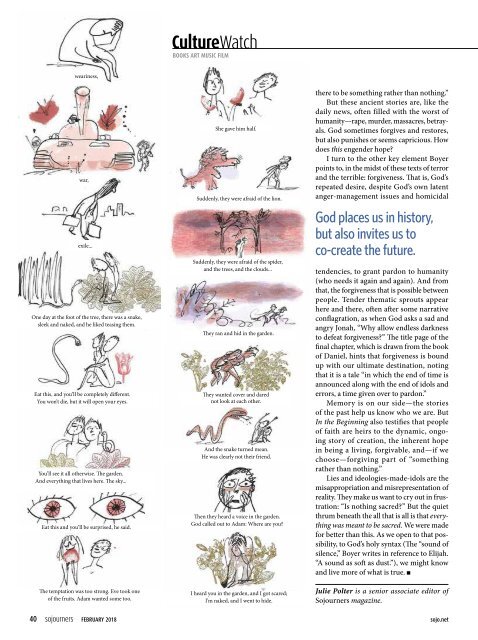february-2018
Create successful ePaper yourself
Turn your PDF publications into a flip-book with our unique Google optimized e-Paper software.
CultureWatch<br />
BOOKS ART MUSIC FILM<br />
weariness,<br />
war,<br />
exile...<br />
One day at the foot of the tree, there was a snake,<br />
sleek and naked, and he liked teasing them.<br />
Eat this, and you’ll be completely different.<br />
You won’t die, but it will open your eyes.<br />
You’ll see it all otherwise. The garden.<br />
And everything that lives here. The sky...<br />
Eat this and you’ll be surprised, he said.<br />
The temptation was too strong. Eve took one<br />
of the fruits. Adam wanted some too.<br />
She gave him half.<br />
Suddenly, they were afraid of the lion.<br />
Suddenly, they were afraid of the spider,<br />
and the trees, and the clouds...<br />
They ran and hid in the garden.<br />
They wanted cover and dared<br />
not look at each other.<br />
And the snake turned mean.<br />
He was clearly not their friend.<br />
Then they heard a voice in the garden.<br />
God called out to Adam: Where are you?<br />
I heard you in the garden, and I got scared;<br />
I’m naked, and I went to hide.<br />
there to be something rather than nothing.”<br />
But these ancient stories are, like the<br />
daily news, often filled with the worst of<br />
humanity—rape, murder, massacres, betrayals.<br />
God sometimes forgives and restores,<br />
but also punishes or seems capricious. How<br />
does this engender hope?<br />
I turn to the other key element Boyer<br />
points to, in the midst of these texts of terror<br />
and the terrible: forgiveness. That is, God’s<br />
repeated desire, despite God’s own latent<br />
anger-management issues and homicidal<br />
God places us in history,<br />
but also invites us to<br />
co-create the future.<br />
tendencies, to grant pardon to humanity<br />
(who needs it again and again). And from<br />
that, the forgiveness that is possible between<br />
people. Tender thematic sprouts appear<br />
here and there, often after some narrative<br />
conflagration, as when God asks a sad and<br />
angry Jonah, “Why allow endless darkness<br />
to defeat forgiveness?” The title page of the<br />
final chapter, which is drawn from the book<br />
of Daniel, hints that forgiveness is bound<br />
up with our ultimate destination, noting<br />
that it is a tale “in which the end of time is<br />
announced along with the end of idols and<br />
errors, a time given over to pardon.”<br />
Memory is on our side—the stories<br />
of the past help us know who we are. But<br />
In the Beginning also testifies that people<br />
of faith are heirs to the dynamic, ongoing<br />
story of creation, the inherent hope<br />
in being a living, forgivable, and—if we<br />
choose—forgiving part of “something<br />
rather than nothing.”<br />
Lies and ideologies-made-idols are the<br />
misappropriation and misrepresentation of<br />
reality. They make us want to cry out in frustration:<br />
“Is nothing sacred?” But the quiet<br />
thrum beneath the all that is all is that everything<br />
was meant to be sacred. We were made<br />
for better than this. As we open to that possibility,<br />
to God’s holy syntax (The “sound of<br />
silence,” Boyer writes in reference to Elijah.<br />
“A sound as soft as dust.”), we might know<br />
and live more of what is true. n<br />
Julie Polter is a senior associate editor of<br />
Sojourners magazine.<br />
40 sojourners FEBRUARY <strong>2018</strong> sojo.net


